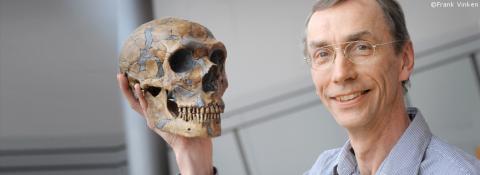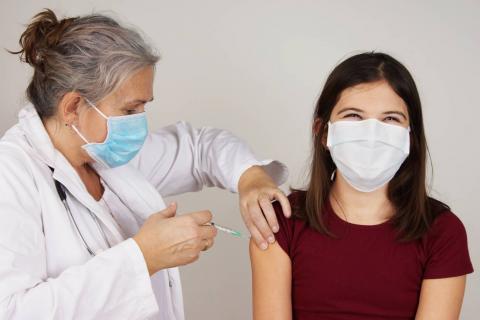Reactions: Nobel Prize in Physiology awarded to Karikó and Weissman for their discoveries that led to the development of effective mRNA vaccines against covid-19
The Karolinska Institute has awarded the Nobel Prize in Medicine or Physiology to Katalin Karikó and Drew Weissman for their groundbreaking discoveries, which have radically changed our understanding of how mRNA interacts with our immune system, and made it possible to develop vaccines at unprecedented speed during the covid-19 pandemic.
Briones - Nobel Medicina EN
Carlos Briones
PhD in Biochemistry and Molecular Biology, CSIC research scientist at the Center for Astrobiology (CSIC-INTA), where he leads a group researching the origin of life and the development of biosensors, and science communicator.
This year's Nobel Prize in Physiology or Medicine has been awarded to the two scientists who have made possible a revolutionary approach in the field of immunology by developing the technology to produce messenger RNA (mRNA) vaccines: Hungarian biochemist Katalin Karikó and American physician Drew Weissman.
The key innovation of their approach is the in vitro production of mRNA with one of its nucleotide bases chemically modified (pseudouridine instead of uridine) and whose sequence encodes the immunogenic protein of interest (e.g. the spike or S protein of the SARS-CoV-2 coronavirus). This mRNA, properly encapsidated, can be delivered by different routes, is internalised by the dendritic cells of the immune system and its translation within them generates and exposes the encoded protein without triggering an unwanted inflammatory response.
This approach was essential for the production of the most efficient SARS-CoV-2 vaccines during the covid-19 pandemic (those marketed by BioNTech/Pfizer and Moderna), and its use has undoubtedly saved millions of lives worldwide. Moreover, this same methodology is being used for the development of vaccines against other pathogens, and in the treatment of different diseases. For all these reasons, this is a well-deserved award, one that I had bet on this year and which I am particularly pleased about. In addition, the award highlights once again the relationship between basic research and its biotechnological applications, and underlines the importance that RNA (the biomolecule that mediates between DNA and proteins in all our cells) has had in biology since life began on Earth, some 3.8 billion years ago.
Rial - Nobel Medicina EN
José Gómez Rial
Head of the Immunology Department at the Complejo Hospitalario Universitario de Santiago de Compostela (CHUS), Servicio Gallego de Salud (SERGAS)
In the field of scientific research, small discoveries mean great scientific advances, and this is the case, given that the research carried out by Katalin Karikó and Drew Weissman on modifications in the composition of mRNA allowed the development of the mRNA vaccines that we know today and that have saved so many lives during the pandemic.
The first mRNA vaccines, in their unmodified formulation, were highly reactogenic, producing a large number of local inflammatory side effects that made their use in humans unthinkable. It was the work of Karikó and Weissman who discovered that by making small modifications in the composition of the mRNA (changing a Uridine for a pseudo-Uridine in the formulation of the nucleosides that make up the mRNA molecule), reactogenicity and inflammation decreased, local side effects disappeared and mRNA vaccines began to be applied to humans.
The company name Moderna comes from Modi-RNA (modified RNA).
Alcamí - Nobel Medicina EN
Pepe Alcamí
IDIBAPS researcher and scientific director of the HIV Unit at Hospital Clínic de Barcelona
Personally, I am delighted that Katalin Karikó, whom I recently met at the Fundación Jiménez Díaz memorial lecture, was awarded the Nobel Prize. In a way it was the "chronicle of a Nobel foretold" because Drew Weissman and Katalin Karikó are the progenitors of the RNA modification that allows the proteins it encodes to be expressed at a high level without the cellular machinery degrading that RNA.
I would highlight two aspects of this Nobel:
- The first is the prize for perseverance, especially that of Katalin Karikó, who played an essential role in the development of this technology, and who persevered despite the fact that her work was not recognised by the 'official academy'. As she herself told us, in a highly competitive system she did not get research projects because her line of work was not considered a priority.
- Second, basic research is rewarded, not developers or companies, even though they have played a key role in the development of RNA vaccines against covid-19. The message is that good science should be supported, without demanding that it be translational from the outset, because we do not know how far basic research will go, apparently further away from practical application.
In this case, Weissmann and Karikó's work, academic, impeccable, elegant, focused on a basic research question, has literally saved the lives of millions of people. As José Angel Valente's poem says, We do not know how far, or how long, a word, in this case a research paper, can go.
Ana Fernández - Nobel Medicina EN
Ana Fernández Sesma
Researcher and virologist, professor and head of the Department of Microbiology at the Icahn School of Medicine at Mount Sinai in New York
I think it is a completely correct Nobel Prize that recognises the work of scientists over many years in a fundamental science - I don't like to call it basic, but fundamental - such as the modifications of mRNA that have allowed it to stabilise and be used for therapies, in this case, for vaccines.
It is simply a basic discovery that has allowed these vaccines to be developed in record time because of their stability and because it has been possible to understand how to modify them. Apart from the fact that it has rewarded a team that works very well and has been working for many years without recognition and with almost no support. And on top of that, in the case of the United States, it is always nice to see migrants from other countries who have developed their careers abroad and who achieve this kind of success. It is a joy and, above all, that a woman has been recognised, as we know there are very few [among the laureates], and it is totally deserved.
Isabel Sola - Nobel Medicina EN
Isabel Sola
Co-director of the coronavirus group at the National Biotechnology Centre (CNB-CSIC)
I think it is a well-deserved award. It recognises the basic research work of Karikó and Weissman around 2005, which has led to the development of a new class of mRNA vaccines that have saved millions of lives in the pandemic.
In my view, it is a prize for basic science and its potential application to solve real-world problems. It is an example of the perseverance of researchers to go ahead with their mRNA work, despite many refusals to fund it. Although there were some attempts to use mRNA as a therapeutic molecule in gene therapy or cancer before 2020, the pandemic was finally the opportunity to apply it against a new emerging virus. We have all experienced the success of the results first-hand.
For those who doubt covid vaccines because of their rapid development, this award also demonstrates that mRNA vaccines have a long research history of more than 20 years behind them.
The sum of the prior knowledge gained by Kariko and Weissman and the opportunity to turn it into a pharmaceutical product have been instrumental in overcoming the worst of the pandemic.
Amós - Nobel Medicina EN
Amós García Rojas
Former head of the Epidemiology and Prevention Service of the General Directorate of Public Health of the Canary Islands Health Service, former president of the Spanish Vaccination Association (AEV) and until his retirement in 2024 a member of the WHO Standing Group for Europe
Without a doubt, the Nobel Prize for these two researchers is more than justified for several reasons: firstly, because they have introduced a totally new element in the world of vaccines, such as messenger RNA vaccines, which should lead us to change the historical perception we have of how vaccines intervene in the context of protection against certain transmissible diseases. And also, obviously, because they have provided a rapid and safe response to the major health problem that has arisen in recent times, which has been the SARS-CoV-2 pandemic.
These two elements made it well justified that they should have been awarded the Nobel Prize last year. This was not the case and we all hoped and expected that it would be consolidated in this year's session, and it has been. They are to be congratulated, it is fully deserved and thanks to them the innovation in the world of vaccines that has arisen thanks to their research work means a turning point where nothing will remain the same.
África González - Nobel Medicina EN
África González-Fernández
Professor of Immunology at the University of Vigo, researcher at CINBIO, and member of the RAFG
We should all congratulate ourselves that the Nobel Academy has awarded this prestigious prize to Dr Katalin Karikó and Dr Drew Weissman, a biochemist and immunologist respectively, a clear example of the importance of collaboration between disciplines, for their pioneering work in the development of RNA vaccines. It took a pandemic for this technology to make the leap to clinical use. We will never know if it could have remained in a forgotten drawer, like many other discoveries, if we had not had the arrival of the SARS-CoV-2 coronavirus.
Dr. Katalin Karikó, a Hungarian-born scientist, has been the pioneer in studying and believing for decades that it was possible to use RNA (ribonucleic acid) to develop vaccines. Later collaborating with Dr Drew Weissman, and after several modifications, they demonstrated the usefulness of this new technology, which was held up for many years by misunderstanding, lack of funding and little support from the international scientific community.
The RNA vaccine, instead of traditional vaccines that use the whole micro-organism or parts of it, uses only instructions (RNA sequences) for the cell itself to produce the specific protein. In order to make the RNA stable, it is introduced into lipid nanoparticles, which will allow it to remain stable and trigger an effective immune response.
Thanks to this vaccine, millions of people have been saved from becoming seriously ill or dying in the covid-19 pandemic, but it has also opened the door to the development of new therapies with this technology: they are already working on other vaccines, and on therapies for cancer and autoimmune diseases thanks to this technology.
It is a real source of pride for Immunology that the Swedish Academy has awarded them this prize for the development of RNA vaccines. I propose that streets in Spanish towns and cities be named after Katalin Karikó.
Natalia y Manel - Nobel de Medicina EN
Natalia Egri
Specialist in Immunology at the Immunology Department of the Hospital Clínic de Barcelona, specialising in immune response to anti-infectious vaccines
Manel Juan
Head of the Immunology Service
The SARS-CoV-2 pandemic has positioned immunology and vaccinology in a central place worldwide in the context of infections and has generated an urgent need to develop safe and effective vaccines. Thanks to their discoveries, Drs. Katalin Karikó and Drew Weissman have been able to propose a tool that opens up the possibility of designing messenger RNA vaccines in the context of infections (and even in other diseases), allowing this type of vaccine to be developed with unusual speed and great efficiency. In fact, it is worth remembering that the mRNA vaccine against SARS-CoV-2 was developed thanks to the previous development of antitumor vaccines which could be a major advance in the short term.
All of this has been crucial, as immunization through vaccination has allowed us to face and largely resolve the COVID-19 pandemic, saving millions of lives worldwide. We hope that the urgency criteria for the approval of these vaccines will be imposed on the regulatory authorities, since for many patients the situation is a "personal emergency" (many will die in the years it will take for these approvals to be granted) and they cannot wait the long periods imposed by the current regulatory standards. For example, the fact that the mRNA sequence is considered to be very different product, and the need to start the approval processes for it, slows down its implementation (as evidenced by the fact that we cannot implement mRNA from SARS-CoV-2 variants that are more prevalent than those that were approved at the time). We have great opportunities to improve the health of our citizens if we prioritize urgency and logic in the treatment of cancer, many infections and even many other immune-mediated diseases that have no available therapeutic options. Drs. Katalin Karikó and Drew Weissman have opened a door to improving health across the planet.
Ignacio Molina - Nobel Medicina EN
Ignacio J. Molina Pineda
Professor of Immunology and Director of the Department of Biochemistry and Molecular Biology 3 and Immunology at the University of Granada
The complex information contained in our genes (DNA) needs to be processed in an intermediate step (RNA) before being converted into the final products that are expressed in cells. Injecting this RNA to achieve a therapeutic effect was an idea put forward in the early 1990s, but there were two major problems: RNA is highly unstable and, above all, it provokes a rapid and potent immune reaction that quickly destroys it, making its therapeutic application unfeasible.
In 2005, Karikó and Weissman made the extraordinary discovery that by making small modifications to the structure of RNA, it was no longer immunogenic, so it was not destroyed by the immune system and could be used in many therapeutic strategies. In addition to this seminal discovery, initially received with scepticism by the scientific community, Karikó and Weissman made important advances in methods for its purification and administration, opening a new era in the treatment of diseases such as cancer and the prevention of infectious diseases, due to its safety, speed of production and low cost. An extraordinary discovery.
Margarita del Val - nobel 2023
Margarita del Val
Virologist and immunologist at the Severo Ochoa Centre for Molecular Biology, coordinator of the CSIC interdisciplinary research platform on Global Health.
The impetus for breakthroughs in research often comes when technological developments allow it. The development and commercialisation of messenger RNA vaccines against the covid-19 pandemic is a clear example of this. The 2023 Nobel Prize in Physiology recognises the long history of basic research by Dr. Katalin Karikó and Dr. Drew Weissman that has led to the optimal modification of messenger RNA and its delivery in lipid particles. Where necessary, basic knowledge has been applied to such a pressing need as the global pandemic emergency, which required rapid industrial development. These vaccines have succeeded in inducing such a strong immunity of protective activity in a large part of humanity that scientific research has enabled us to confront and, above all, overcome the pandemic.



